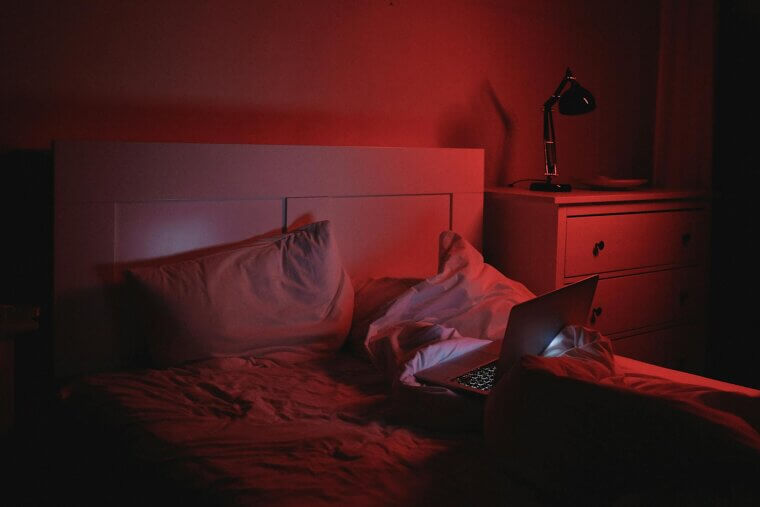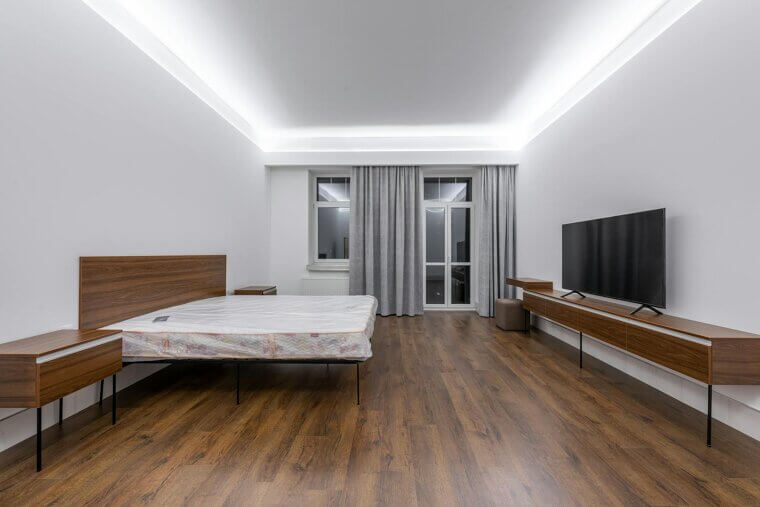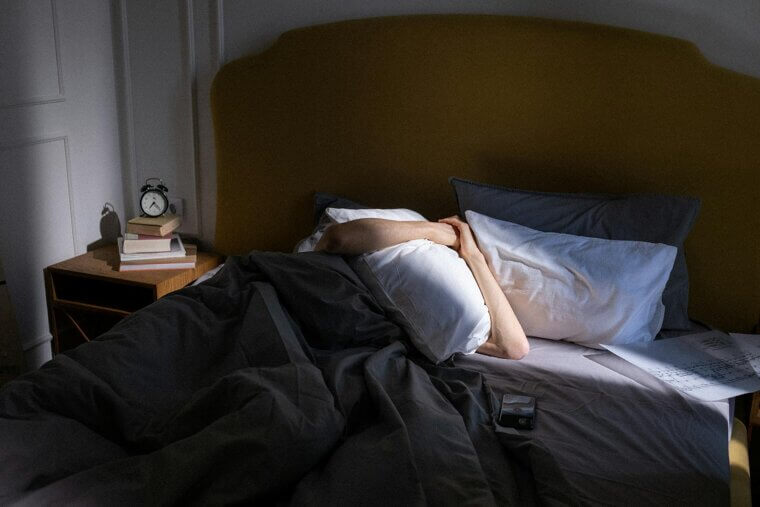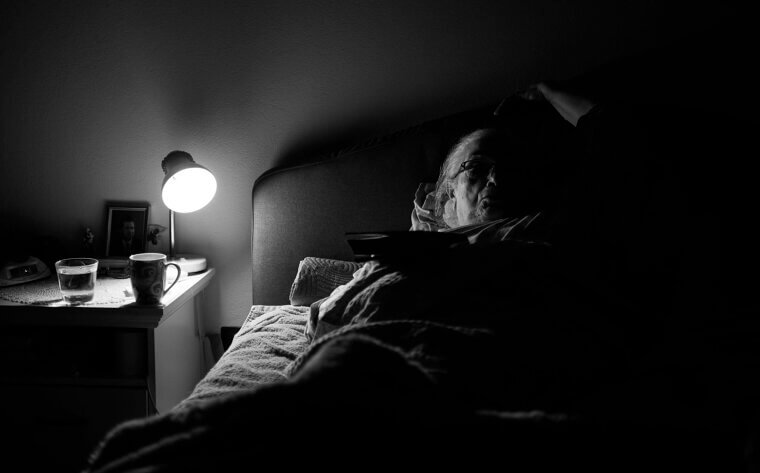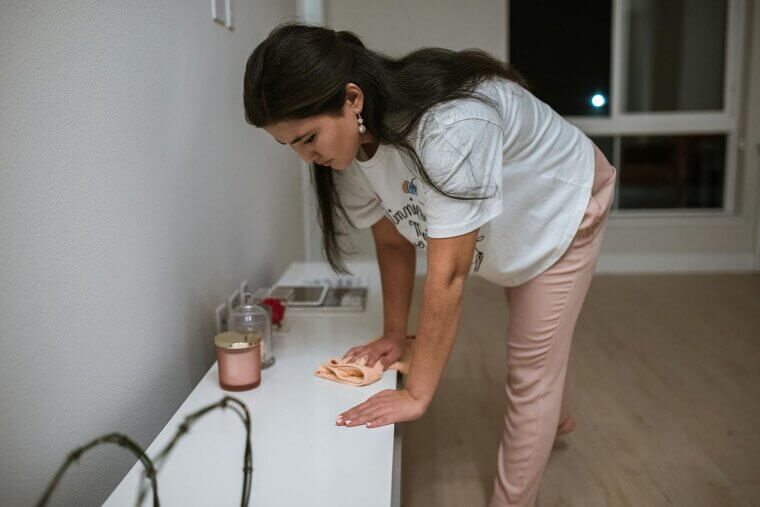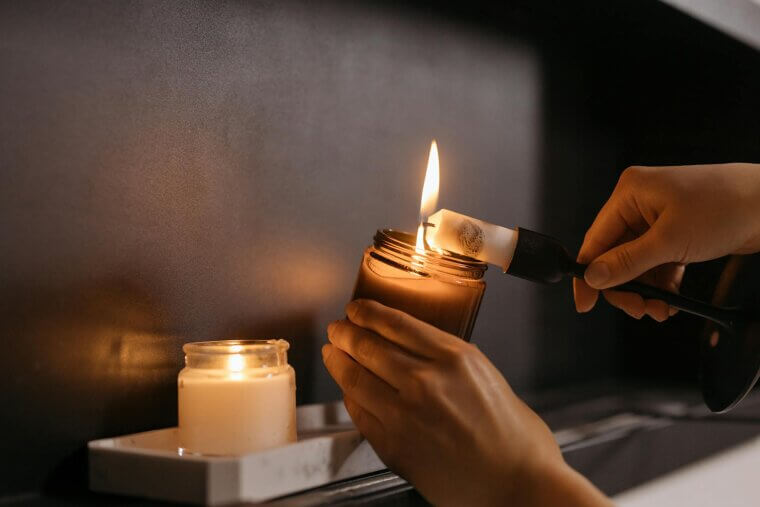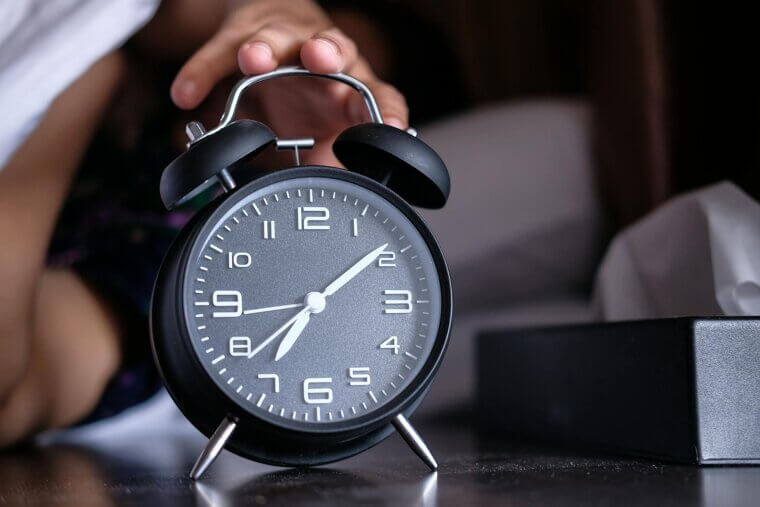Late-Night Cheese
Enjoying a cheese snack before bed might seem harmless, but it could be disrupting your sleep. Cheese is rich in tyramine, an amino acid that can increase alertness, making it harder to wind down. Additionally, high-fat content in cheese can lead to indigestion or discomfort, further interrupting restful sleep. Opting for lighter, low-fat snacks instead might help promote better sleep quality. Consider your evening snack choices carefully for a peaceful night.
Switching to sleep-friendly snacks could make a difference. Choose options that support relaxation and rest without causing disruptions. Restful nights are within reach!
Caffeine Consumption
Sipping on a hot cup of coffee in the evening might seem comforting, but it could be the culprit behind your sleepless nights. Caffeine is a well-known stimulant that can disrupt your sleep cycle, keeping your mind alert when it should be winding down. Even if you feel immune to its effects, it can still reduce the quality of your rest. Avoiding caffeine in the hours leading up to bedtime can significantly improve your sleep quality.
Consider substituting your evening coffee with a caffeine-free alternative to help pave the way for a more restful slumber.
Screen Time
Using your phone right before bedtime can wreak havoc on your sleep schedule. The blue light emitted from screens interferes with melatonin production, making it harder to fall asleep. Engaging with stimulating content can also keep your mind active when it should be winding down. This habit might seem harmless, but it can significantly delay the onset of sleep. Creating a relaxing pre-sleep routine can help improve sleep quality.
To reclaim restful nights, consider setting boundaries with digital devices before bed. Prioritizing relaxation over screen time can lead to more peaceful sleep.
Late-Night TV
Watching TV late into the night can disrupt your sleep schedule more than you might think. The bright screen light interferes with your body's natural sleep-wake cycle, making it harder to fall asleep. Engaging shows can keep your mind active and alert, preventing you from winding down properly. Additionally, the noise and action can increase stress levels, delaying relaxation. Reducing screen time before bed is crucial for restful sleep.
For a peaceful night's rest, try replacing TV time with calming activities like reading or meditation. This simple change can significantly improve your sleep quality.
Bedtime Screen Distractions
Using electronic devices in bed is a habit that can make it harder to sleep at night. The blue light emitted from screens can interfere with your natural sleep cycle, tricking your brain into staying alert. This overstimulation can delay the production of melatonin, the hormone responsible for regulating sleep. Additionally, engaging with digital content can keep your mind active when it should be winding down. Avoiding screens before bedtime is crucial for better rest.
Limiting screen time before bed can improve your sleep quality. Try setting a digital curfew to help you relax and unwind naturally.
Late-Night Eating
Indulging in late-night snacks might seem harmless, but it can interfere with your ability to fall asleep. Eating heavy meals or snacks close to bedtime can cause discomfort and indigestion, making it difficult to relax. The body is forced to focus on digestion rather than winding down, which can disrupt the sleep cycle. Additionally, spicy or fatty foods can lead to heartburn, further hindering restful sleep. Consider lighter snacks to improve your nighttime routine.
To enhance your sleep quality, try adjusting your eating schedule. Aim to finish meals a few hours before bed, allowing your body to digest properly and prepare for restful slumber.
Artificial Lighting
Bright artificial lighting in your bedroom can be a sneaky culprit for restless nights. This type of lighting mimics daylight, disrupting your body's natural sleep-wake cycle. Exposure to such light before bed can inhibit the production of melatonin, the hormone responsible for signaling sleep. Over time, it becomes harder for your brain to recognize when it’s time to wind down. Consider using dimmer, warm lights to promote better sleep.
For a restful sleep environment, assess your bedroom's lighting. Opt for softer, warmer lights to foster relaxation and enhance your sleep quality.
Pets in Bed
Sharing your bed with pets can seem comforting, but it might hinder your sleep quality. Pets are known to move around or make noise during the night, disrupting your rest. Their presence can also influence your sleeping position, leading to discomfort. Moreover, pets can carry allergens that might affect your breathing. It’s essential to consider these factors to ensure a restful night’s sleep. Sleep quality impacts overall well-being.
To improve your sleep, consider setting boundaries for pets at night. Designate a separate sleeping area for them. Reclaim your restful nights.
Late-Night Workouts
Exercising late in the evening might seem like a great way to relieve stress, but it can actually make falling asleep more difficult. When you work out close to bedtime, your body temperature rises, and your adrenaline levels increase. This heightened state can interfere with your ability to wind down. Additionally, the artificial lighting in gyms can disrupt your natural sleep-wake cycle. Consider shifting your workout to earlier in the day for better sleep.
Reevaluating your exercise schedule might be the key to enjoying more restful nights. Adjust your routine to support a peaceful sleep.
Late-Night Sugar
Indulging in sugary treats before bed can keep you awake longer than you'd like. The sugar rush raises your energy levels, making it harder to wind down for the night. Additionally, consuming sweets can increase your heart rate, which might contribute to restlessness. This spike in energy can disrupt your body's natural sleep cycle, leading to a night of tossing and turning. Think twice before grabbing that dessert!
Avoiding sugary snacks in the evening can help ensure a more restful sleep. Making mindful choices about your diet can significantly enhance the quality of your nightly rest.
Screen Time
Using electronic devices before bed can significantly disrupt your sleep cycle. The blue light emitted from screens interferes with the production of melatonin, the hormone responsible for regulating sleep. This can lead to difficulty falling asleep and reduced sleep quality. Additionally, engaging with stimulating content can keep your mind active, making it harder to unwind. Reducing screen time before bed can help promote a more restful night's sleep.
Consider setting a screen curfew an hour before bed to help your body prepare for sleep. Creating a calming bedtime routine can significantly improve your sleep quality.
Bright Light
Keeping a bright light on while trying to sleep can significantly disrupt your body's natural circadian rhythm. Exposure to artificial light at night can confuse your internal clock, making it difficult for your mind to transition into sleep mode. This prolonged exposure can suppress the production of melatonin, the hormone responsible for regulating sleep. As a result, falling asleep becomes a challenge, leading to restless nights and groggy mornings. To improve sleep quality, consider dimming lights or using blackout curtains.
By adjusting your nighttime lighting, you can foster a more sleep-friendly environment. Embrace darkness for a deeper, more restorative rest.
Gaming Before Bed
Late-night gaming can be a major culprit in disrupting your sleep. Intense and immersive, gaming stimulates your brain, making it harder to wind down. The blue light from screens also interferes with melatonin production, the hormone responsible for regulating sleep. Engaging in action-packed games elevates adrenaline levels, keeping you alert rather than relaxed. Establishing a cut-off time for gaming can help create a more restful bedtime routine.
Limiting screen time in the evening and opting for calming activities instead can significantly improve your sleep quality. Prioritize relaxation to enjoy a more restful night.
Energy Drinks
Consuming energy drinks late in the day can significantly disrupt your sleep. These beverages are packed with caffeine and other stimulants that increase alertness, making it difficult to wind down at night. The initial energy boost might seem beneficial, but it can lead to restless nights and an uneasy sleep cycle. Over time, this can contribute to a significant sleep debt, leaving you feeling exhausted. Opt for herbal tea instead.
To ensure better sleep quality, consider cutting out energy drinks during the late afternoon and evening. This simple change might help restore your natural sleep patterns.
Sleepless Anxiety
Lying awake in bed, staring at the clock as the hours tick by, can be a frustrating experience. Anxiety and stress creep in, preventing you from drifting into a restful sleep. The mind races, jumping from one worry to another, making relaxation seem impossible. This cycle of anxious thoughts can turn bedtime into a nightly struggle, leaving you feeling exhausted by morning. Understanding and addressing this can restore your sleep.
To combat sleepless anxiety, try incorporating calming bedtime rituals. Breathing exercises or meditation can help soothe your mind, paving the way for a peaceful night's sleep.
Screen Time
Spending time on your phone before bed can seriously disrupt your sleep. The blue light emitted by screens can interfere with your body's natural sleep-wake cycle, making it harder to fall asleep. Engaging with stimulating content, whether it's social media or news, keeps your brain active when it should be winding down. This prolonged screen exposure can delay the release of melatonin, a hormone essential for sleep. Consider setting a screen curfew to improve your rest.
Limiting screen exposure before bedtime can significantly enhance your sleep quality. Try reading a physical book or practicing relaxation techniques instead.
Spicy Late-Night Meals
Indulging in spicy foods late at night can be a major sleep disruptor. The fiery ingredients can lead to heartburn and indigestion, making it challenging to fall asleep peacefully. The heat from spices can also raise your body temperature, which is counterproductive for a good night's sleep. Additionally, the stimulating effects can increase alertness, keeping you awake longer. Avoiding spicy meals before bedtime can promote more restful sleep.
To enjoy a peaceful night, consider opting for milder meals in the evening. Making mindful dietary choices can significantly enhance your sleep quality and overall wellbeing.
Social Media Scrolling
Endless scrolling through social media can be detrimental to your sleep quality. Engaging with these platforms late at night exposes you to blue light, which can interfere with your body's natural sleep-wake cycle. The constant barrage of information and notifications keeps your mind active, making it harder to wind down. Additionally, social media can evoke emotions like stress or anxiety, further hindering your ability to relax. Prioritizing offline activities can help restore restful sleep.
To reclaim better sleep, consider setting a social media curfew before bed. This simple change can help your mind unwind naturally.
Cleaning Before Bed
Engaging in late-night cleaning sessions can significantly impact your sleep quality. Although tidying up might seem productive, it can be overly stimulating before bedtime. The physical activity and increased heart rate can make it difficult to unwind. Additionally, the bright lights and noise involved can disrupt your body's natural sleep signals. Instead, consider setting aside time earlier in the day for chores to help ensure a smoother transition to sleep.
Reserving cleaning tasks for daytime can help create a more peaceful evening routine. By doing so, you allow your mind and body to relax, paving the way for restful sleep.
Late-Night Eating
Eating a large meal right before bed can significantly disrupt your sleep. Digesting heavy or spicy foods late at night might lead to indigestion or heartburn, making it difficult to fall asleep comfortably. Your body remains active in processing the meal instead of winding down for rest. This habit might also cause your metabolism to stay elevated, keeping you awake longer. Opting for lighter snacks can improve your sleep quality.
Consider adjusting your meal times to enhance your nighttime rest. A lighter diet in the evening can lead to more peaceful sleep.
Lack of Blinds or Curtains
Not having blinds or curtains allows light from street lamps, cars, or early morning sun to enter your room, which can confuse your body’s internal clock. Even small amounts of light can suppress melatonin production, making it harder to fall or stay asleep. A darker room helps signal your brain that it’s time to rest.
Light from outside can disrupt your body’s sleep signals and make it harder to stay asleep.
Reading the News
Reading the news at night can keep your mind active and anxious, especially if the stories are stressful or emotionally charged. This mental stimulation raises cortisol levels, making it harder for your body to relax and fall asleep. The blue light from your phone or tablet also suppresses melatonin, disrupting your natural sleep-wake cycle.
Reading the news at night can raise stress levels and keep your mind alert, making it harder to unwind. The screen’s blue light also suppresses melatonin, disrupting sleep.
Online Shopping
Engaging in online shopping before bed can significantly disrupt your sleep. The bright screen light interferes with your natural sleep hormones, making it harder to fall asleep. Additionally, the excitement and stress of making purchase decisions can keep your mind active and alert when it should be winding down. Transactions can also create anxiety around spending, further diminishing relaxation. Avoiding this habit can help improve your nightly rest.
To enhance your sleep quality, consider setting a digital curfew. Reducing screen time can promote a more restful night and a refreshed morning.
Headphone Disruption
Using headphones at night to listen to music or podcasts might seem relaxing, but it could actually be disrupting your sleep. The sound, even at low volumes, keeps your brain engaged, making it harder to drift into deep rest. Over time, this can lead to poor sleep quality and a restless night. Also, wearing headphones in bed can be uncomfortable, causing physical discomfort that may keep you awake. Consider alternatives like white noise machines or meditation apps to promote better sleep habits.
For a truly restful night, try removing the headphones and embracing silence. Small changes can significantly improve your sleep quality and overall well-being.
Candle Lighting
Lighting scented candles before bedtime might seem relaxing, but it can actually interfere with your sleep. The fragrances, while pleasant, can stimulate your senses and keep your mind active when it should be winding down. Additionally, the flickering light from the flame can disrupt the production of melatonin, the hormone responsible for regulating sleep. Opting for a candle-free evening routine might be a simple change that can lead to more restful nights.
Consider replacing candles with calming rituals like reading or meditating. This shift can help you create a more sleep-friendly environment and promote a deeper, uninterrupted rest.
Hot Chocolate Night Cap
Drinking hot chocolate at night can interfere with sleep because it contains caffeine and sugar, which can keep you alert. The added sugar may also cause a spike in energy before bed.
The caffeine and sugar in hot chocolate can keep you awake and make it harder to fall asleep.
Late-Night Work
Working late into the night can significantly disrupt your sleep cycle. The bright screens and mental stimulation from tasks keep your brain alert, making it harder to wind down when it’s finally bedtime. Late hours can lead to increased stress, further impacting your ability to relax and drift off to sleep. Establishing a clear boundary between work and rest can help your mind transition into sleep mode more easily. Over time, this change will promote more restful nights.
To enhance your sleep quality, consider reducing late-night work. This shift can lead to more restorative rest, helping you feel rejuvenated each morning.
Drinking Matcha
Sipping on a cup of matcha may seem like a calming evening ritual, but it could be keeping you up at night. Matcha contains a significant amount of caffeine, which can interfere with your sleep cycle. Consuming it too late in the day might lead to restlessness and difficulty falling asleep. If you're struggling with insomnia, consider swapping your matcha for a caffeine-free alternative in the evening. Prioritizing sleep-friendly habits is key.
Reevaluating your evening beverage choices can make a world of difference in your sleep quality. Consider switching to herbal tea to ensure a restful night.
Nighttime Journaling
Writing in a journal before bed might seem like a calming ritual, but it can actually stir your mind into overdrive. Processing your day's events or brainstorming ideas can keep thoughts racing. This mental activity can heighten alertness, making it difficult to drift off into a peaceful slumber. While reflection is important, try to reserve it for earlier in the evening to ensure your mind is at ease by bedtime.
For a restful night, consider adjusting your journaling routine. Opt for quiet relaxation techniques to calm your thoughts, promoting a more serene transition to sleep.
Fast Food Indulgence
Late-night cravings often lead us to greasy, heavy meals that are tough on our digestive systems. Consuming fast food before bed can lead to discomfort and indigestion, making it difficult to drift into a restful slumber. The high fat content and spices may cause heartburn, keeping you awake longer than intended. Instead, opt for lighter snacks to aid digestion and promote better sleep patterns. Small changes can make a big difference.
Reconsider your evening meal choices for improved sleep quality. Opt for lighter options and avoid heavy, greasy foods to enhance your nightly rest.
Soda
Soda can disrupt sleep due to its caffeine and high sugar content, both of which can make it harder to fall asleep. The carbonation may also cause bloating or discomfort that keeps you awake.
Soda’s caffeine and sugar can boost energy and disrupt your sleep cycle.
Late-Night Clock Watching
Constantly checking the time can interfere with your ability to fall and stay asleep. When you frequently glance at the clock, it increases anxiety about not getting enough rest, making it harder to relax. This habit can lead to a cycle of stress and sleeplessness. Instead of counting the hours left to sleep, try focusing on calming activities that promote tranquility. This shift can help transform restless nights into peaceful slumber.
Breaking the clock-watching habit can significantly improve your sleep quality. By reducing anxiety and focusing on relaxation, you can enjoy a restful night's sleep and wake up refreshed.
Perfume Before Bed
Applying perfume before bed might seem like a calming ritual, but it can actually disrupt your sleep. Strong scents stimulate your senses and can keep your brain alert, making it harder to relax. Even subtle fragrances can be irritating if you're sensitive to smells. Moreover, synthetic ingredients in perfumes might cause allergic reactions, leading to discomfort or disrupted breathing. So, consider skipping this habit for a more restful night.
To ensure a peaceful sleep, try using unscented products in your bedtime routine. Your body will thank you in the morning.





